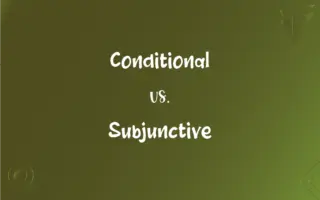Uncertain vs. Confused: What's the Difference?
Edited by Aimie Carlson || By Janet White || Published on December 5, 2023
Uncertain refers to a lack of sureness or confidence in a situation, while confused describes a state of being bewildered or unclear in understanding.

Key Differences
Uncertain implies doubt or indecision, often due to a lack of information or clarity about future outcomes. In contrast, confused describes a state of mind where understanding is muddled or jumbled, often due to too much information or its complexity.
When someone is uncertain, they are unsure about making a decision or forming an opinion. Confused, however, indicates a struggle to comprehend or distinguish between different ideas or options.
Uncertainty can exist even with clear information, stemming from indecisiveness or unpredictability of circumstances. Confusion, on the other hand, arises from difficulty in processing information or understanding a situation clearly.
In uncertainty, the path forward or the truth of a matter is not clear. Confusion is more about the disorganization of thoughts, leading to misunderstanding or error in perception.
Uncertain situations can often be clarified with additional information or time. However, resolving confusion typically requires simplification, explanation, or reorganization of the existing information.
ADVERTISEMENT
Comparison Chart
Root Cause
Lack of sureness or clarity about future outcomes
Difficulty in understanding or processing information
Decision Making
Hesitancy in making decisions
Struggle to comprehend or differentiate options
Information Impact
May exist despite clear information
Often arises from too much or complex information
Mental State
Doubt or indecision
Bewilderment or disorganized thoughts
Resolution
Often requires additional information or time
Typically requires clarification or simplification of information
ADVERTISEMENT
Uncertain and Confused Definitions
Uncertain
Lacking confidence or clarity about something.
She was uncertain about the right path to take.
Confused
Mistaking one thing for another.
She confused the meeting dates and missed the appointment.
Uncertain
Unpredictable or not guaranteed.
The outcome of the game was still uncertain.
Confused
Unable to think clearly or to understand something.
The complex instructions left her confused.
Uncertain
Not firmly established or settled.
Their plans for the weekend were still uncertain.
Confused
Disoriented and unclear about one's surroundings.
After waking up, he was momentarily confused about the time.
Uncertain
Indecisive or unsure in making a decision.
He remained uncertain about accepting the job offer.
Confused
Lacking order and clarity in thoughts.
He was confused by the conflicting advice he received.
Uncertain
Ambiguous or open to more than one interpretation.
The meaning of the poem is uncertain.
Confused
Mixed up or jumbled in the mind.
The noisy classroom left the teacher feeling confused.
Uncertain
Not known or established; questionable
Domestic changes of great if uncertain consequences.
Uncertain
Not determined; undecided
Uncertain plans.
FAQs
Can uncertainty be positive?
Yes, it can lead to exploring new possibilities.
Is confusion a sign of mental illness?
It can be, but confusion is also a common, often temporary, state.
Can children experience uncertainty?
Yes, children can feel uncertain just like adults.
Can uncertainty lead to stress?
Yes, prolonged uncertainty can be stressful.
Is uncertainty a part of decision-making?
Yes, it often plays a role in the decision-making process.
Does being confused mean a lack of intelligence?
No, confusion can happen to anyone, regardless of intelligence.
Can uncertainty be a chronic state?
Yes, some people may frequently feel uncertain.
Can confusion be dangerous?
In certain situations, like driving, it can be.
Is confusion a normal part of aging?
Mild confusion can occur, but severe confusion is not normal.
Is confusion always caused by external factors?
No, it can also arise from internal factors like health issues.
Does uncertainty decrease with more information?
Generally, yes, but not always.
Does confusion affect memory?
Yes, it can impact short-term memory.
Is confusion a common reaction to trauma?
Yes, confusion can occur after traumatic events.
Can meditation help with uncertainty?
Meditation can help manage the stress related to uncertainty.
Can confusion be a symptom of sleep deprivation?
Yes, lack of sleep can lead to confusion.
Can uncertainty be a motivational tool?
Yes, it can motivate seeking more information or trying new things.
Can confusion be a side effect of medication?
Certain medications can cause confusion.
Is uncertainty different from doubt?
Yes, doubt is more about skepticism, while uncertainty is about indecision.
Can travel cause uncertainty?
New environments can contribute to feelings of uncertainty.
Is confusion a state of mind?
Yes, it's a temporary state of mental disarray or lack of clarity.
About Author
Written by
Janet WhiteJanet White has been an esteemed writer and blogger for Difference Wiki. Holding a Master's degree in Science and Medical Journalism from the prestigious Boston University, she has consistently demonstrated her expertise and passion for her field. When she's not immersed in her work, Janet relishes her time exercising, delving into a good book, and cherishing moments with friends and family.
Edited by
Aimie CarlsonAimie Carlson, holding a master's degree in English literature, is a fervent English language enthusiast. She lends her writing talents to Difference Wiki, a prominent website that specializes in comparisons, offering readers insightful analyses that both captivate and inform.































































